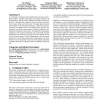388 search results - page 63 / 78 » Guiding random test generation with program analysis |
140
Voted
VALUETOOLS
2006
ACM
15 years 8 months ago
2006
ACM
Min-max functions are dynamic programming operators of zero-sum deterministic games with finite state and action spaces. The problem of computing the linear growth rate of the or...
129
Voted
EUROSYS
2007
ACM
15 years 6 months ago
2007
ACM
As information technology (IT) administration becomes increasingly complex, workflow technologies are gaining popularity for IT automation. Writing correct workflow programs is no...
140
Voted
FAC
2008
15 years 2 months ago
2008
Abstract. Slicing is a program analysis technique that was originally introduced to improve program debugging and understanding. The purpose of a slicing algorithm is to remove the...
115
Voted
RV
2010
Springer
15 years 1 months ago
2010
Springer
Researchers have developed a number of runtime verification tools that generate runtime monitors in the form of AspectJ aspects. In this work, we present Clara, a novel framework ...
158
Voted
BMCBI
2006
15 years 2 months ago
2006
Background: Horizontal gene transfer (HGT) is considered a strong evolutionary force shaping the content of microbial genomes in a substantial manner. It is the difference in spee...

